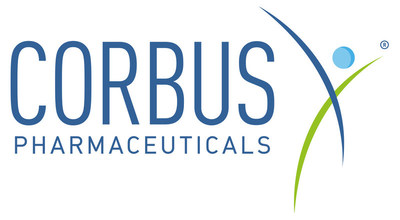Corbus Presents Latest Preclinical Data for CRB-601 at the New York Academy of Sciences Frontiers in Cancer Immunotherapy Conference
Corbus Pharmaceuticals (NASDAQ: CRBP) presented new preclinical data for its anti-αvβ8 integrin monoclonal antibody, CRB-601, at the NYAS Frontiers in Cancer Immunotherapy Conference. The data highlight CRB-601's significant anti-tumor effects, both as a standalone treatment and in combination with anti-PD-1 therapy, across various tumor models including immune-excluded ones. Notably, CRB-601 enhances T-cell proliferation and re-sensitizes tumors to checkpoint inhibition. The company is advancing towards an IND submission in the first half of 2023.
- CRB-601 demonstrated significant tumor growth inhibition as a standalone treatment and in combination with anti-PD-1 therapy.
- Increases in CD4+ and CD8+ T-cells, NK cells, and M1 macrophage polarization observed, indicating potential to overcome immune cell exclusion.
- Durable T-cell memory protection was demonstrated, as tumors did not regrow in treated mice after 30 days.
- None.
Insights
Analyzing...
- CRB-601 is a highly potent and selective anti-αvβ8 integrin monoclonal antibody designed to block the activation of TGFb in the local tumor microenvironment
- Additional non-clinical data demonstrates combination benefit across a diverse range of syngeneic models with differential sensitivity to checkpoint inhibition
- Anti-tumor activity correlates with increases in proliferating CD4+ and CD8+ T-cells as well as the NK cell population and a shift towards M1 macrophage polarization, supporting the hypothesis the CRB-601 may overcome immune cell exclusion
NORWOOD, Mass., May 11, 2022 /PRNewswire/ -- Corbus Pharmaceuticals Holdings, Inc. (NASDAQ: CRBP) ("Corbus" or the "Company"), an immunology company, announced that new preclinical data for CRB-601 are being presented today in an oral presentation at the New York Academy of Sciences (NYAS) Frontiers in Cancer Immunotherapy Conference in New York, NY.
The latest preclinical data for CRB-601 demonstrate its significant effects on inhibiting tumor growth as a single agent and in combination with anti-PD-1 treatment in the MC38 and EMT6 syngeneic tumor models. In addition, CRB-601 restores an anti-PD-1 effect in the 4T1 syngeneic tumor model, a "cold" immune cell-depleted tumor model, when added in combination. This data marks the first time such an effect has been documented in this model with an anti-αvβ8 agent.
The anti-tumor effects in the immune excluded EMT6 model correlated with changes in the immune cell populations in the tumor micro-environment. There were increases in proliferating CD4+ and CD8+ T-cells, NK cells, and a shift in macrophage polarization to the inflammatory M1 phenotype. Collectively these data suggest that treatment with CRB-601 could overcome the immune excluded phenotype established in this model and enhance the efficacy of treatment with anti-PD-1 therapy.
Additionally, in a rechallenge model, tumor-bearing mice initially rendered tumor-free by treatment with CRB-601 + anti-PD-1 were subsequently reinoculated with the same tumor cells (MC38) and monitored for tumor regrowth. After 30 days no tumors had formed in this cohort of animals, whereas all the treatment naïve control mice succumbed to the burden of tumor growth. These data illustrate that the combination treatment of CRB-601 + anti-PD-1 led to durable T-cell memory protection.
"CRB-601 demonstrates robust pre-clinical anti-tumor activity alone and in combination with anti-PD-1 therapy in tumors exhibiting a range of immune involvement. The ability of CRB-601 to significantly reduce the growth of tumors that are non-responsive to checkpoint inhibition and to re-sensitize these tumors to checkpoint blockade continues to support our hypothesis that effective blockade of TGFβ should lead to immune cell perfusion and manifest the benefit of anti-PD-1 therapy. The orchestration of a response involving both the adaptive and innate arms of the immune system by CRB-601 is especially compelling," commented Rachael Brake, Ph.D., Chief Scientific Officer of Corbus.
Corbus is currently developing CRB-601 as a potential treatment for solid tumor cancers, and the program is advancing toward an IND submission in the first half of 2023.
The NYAS presentation is available on the Company website at: corbuspharma.com/NYASpresentation
About Corbus
Corbus is an immunology company committed to connecting innovation to our purpose of improving lives by developing new medicines that target the nexus between the immune system and cancer. Corbus' current pipeline includes anti-integrin monoclonal antibodies that block activation of TGFβ and small molecules that activate or inhibit the endocannabinoid system. Corbus is headquartered in Norwood, Massachusetts. For more information on Corbus, visit corbuspharma.com. Connect with us on Twitter, LinkedIn and Facebook.
Forward-Looking Statements
This press release contains certain forward-looking statements within the meaning of Section 27A of the Securities Act of 1933 and Section 21E of the Securities Exchange Act of 1934 and Private Securities Litigation Reform Act, as amended, including those relating to the Company's restructuring, trial results, product development, clinical and regulatory timelines, market opportunity, competitive position, possible or assumed future results of operations, business strategies, potential growth opportunities and other statement that are predictive in nature. These forward-looking statements are based on current expectations, estimates, forecasts and projections about the industry and markets in which we operate and management's current beliefs and assumptions.
These statements may be identified by the use of forward-looking expressions, including, but not limited to, "expect," "anticipate," "intend," "plan," "believe," "estimate," "potential," "predict," "project," "should," "would" and similar expressions and the negatives of those terms. These statements relate to future events or our financial performance and involve known and unknown risks, uncertainties, and other factors, including the potential impact of the recent COVID-19 pandemic and the potential impact of sustained social distancing efforts, on our operations, clinical development plans and timelines, which may cause actual results, performance or achievements to be materially different from any future results, performance or achievements expressed or implied by the forward-looking statements. Such factors include those set forth in the Company's filings with the Securities and Exchange Commission. Prospective investors are cautioned not to place undue reliance on such forward-looking statements, which speak only as of the date of this press release. The Company undertakes no obligation to publicly update any forward-looking statement, whether as a result of new information, future events or otherwise.
INVESTOR CONTACT:
Sean Moran
Chief Financial Officer
Sean.moran@corbuspharma.com
![]() View original content to download multimedia:https://www.prnewswire.com/news-releases/corbus-presents-latest-preclinical-data-for-crb-601-at-the-new-york-academy-of-sciences-frontiers-in-cancer-immunotherapy-conference-301544859.html
View original content to download multimedia:https://www.prnewswire.com/news-releases/corbus-presents-latest-preclinical-data-for-crb-601-at-the-new-york-academy-of-sciences-frontiers-in-cancer-immunotherapy-conference-301544859.html
SOURCE Corbus Pharmaceuticals








